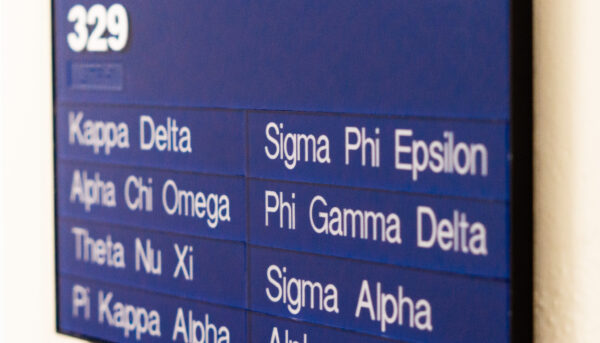Rush Week on Old Main Hill: Fraternities in full swing for recruitment
From Sept. 11-15, men from all over Utah State University gathered to learn about and possibly join one of the five on-campus fraternities. Within Rush Week, various Greek life groups hosted activities and bonding time to help students find out if these organizations will be a place where they find a second family
Often, people don’t fully understand what a fraternity is. Mason Alder, the active Interfraternity Council vice president of recruitment, shared some basic explanations of what these groups are and what they do for their members.
“At its very base, I would say a fraternity is an organization that helps students with their academics, their social life, their health…body and mental,” Alder said. “It’s basically just a group of guys in a brotherhood that try and help each other out in any way they can.”
Greek life organizations also provide their members with a sense of home and a support system. Po Yamakoshi, who attended Rush Week and received a bid from Sigma Phi Epsilon, shared his reasons for looking into fraternities on campus.
“They explained in Sig Ep that one big thing is brotherly love,” Yamakoshi said. “That’s kind of what I connected with. It’s being there for your brothers and holding yourself accountable to what you believe and representing them. It’s about having fun, being studious and being driven.”
Rush Week consists of activities such as barbecues, games and socials so possible new members get to know each house and get a feel for what being a member of that fraternity would be like.
This also allows the fraternity to get to know the people who want to pledge so they can begin considering who to extend bids to. Extending bids was described by Alder as each fraternity inviting possible new members to pledge.
 © CWild Photography
© CWild Photography List of fraternities at USU, 9/20/23.
“A lot of it is, we put on an event for Rush Week, we tell our chapter members to invite as many Potential New Members as they can or PNMs,” Alder said, “All the brothers can talk to the PNMs at the events, see if they like them, see how they function, stuff like that, and then if we think they’d be a good fit for our chapter we give them a bid at the end of the week.”
“The process was just putting myself out there, being authentic and being myself was important,” Yamakoshi said.
Utah State generally has a smaller scale Greek Life, with Alder estimating about 350 total participants. However, the smaller size is not a hindrance in the opinions of those involved.
“I feel like the bigger they get, the more likely they are to turn into a stereotypical frat,” Alder said. “Definitely USU in my experience and from when I talk to the members of different fraternities says that first and foremost basically every fraternity has academics as their first thing. After that, I know mental health and physical health is a big one. Social life comes after that.”
Different fraternities can be lumped into a group as just “frats,” but each frat is different from each other. Alder shared that each fraternity has different bylaws and cultures, and different people gravitate towards each one.
Fraternities and Greek life in general can face multiple stereotypes, but the chapters on Old Main Hill focus on being their members’ safe place, pushing each other to improve each day.
“They’re dope guys,” Yamakoshi said. “They’re definitely not what you’d expect from a typical movie fraternity. They’re there for each other, even through thick and thin.”
When asked what he’d like people to think about when considering fraternities, Alder shared one piece of advice.
“Let your curiosity drive you.”

